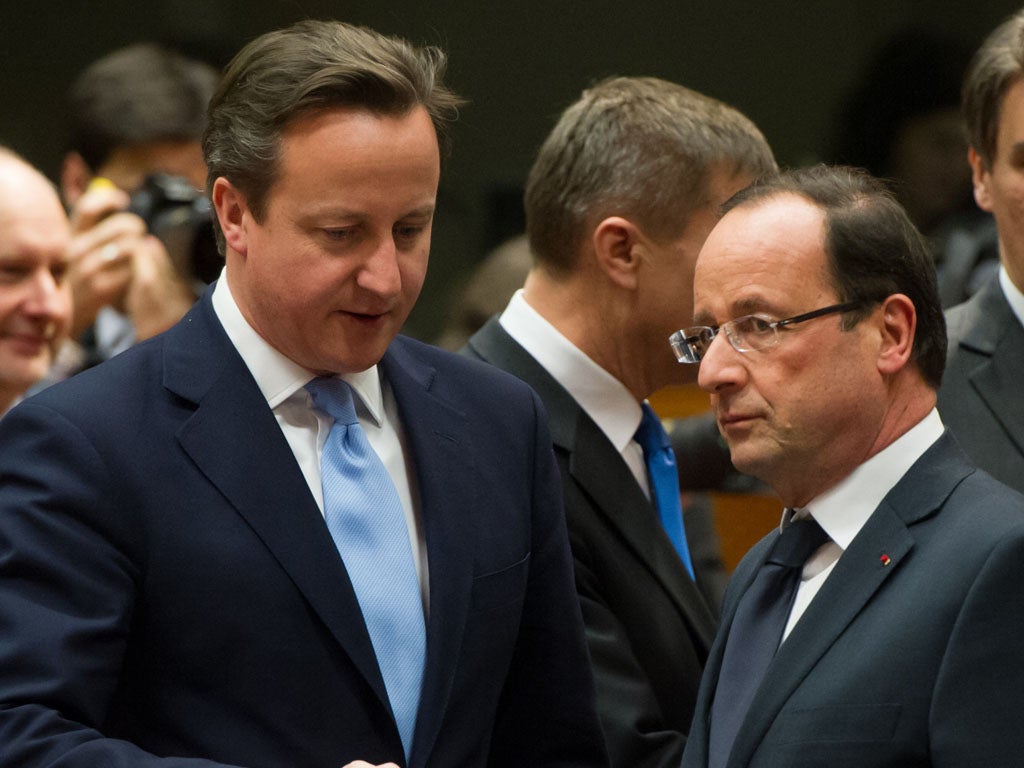On Europe, it's not whether we stay or go that matters. It's how we negotiate our relationship
Ahead of David Cameron's much-vaunted speech on Britain's relation with Europe, our Chief Economics Commentator surveys the Prime Minister's options


On Friday, we get the Prime Minister’s vision of Britain’s future relationship with Europe. Economics will inevitably loom large and, though there are decent reasons to expect that the relationship will be shaped more by politics than economics, the economic arguments are already being marshalled by both sides to support their cause.
The economics fraternity is, unsurprisingly, split on the issue. But the business one is also split, just as it was over whether Britain should adopt the euro, with big businesses tending to support membership and medium and small businesses opposing it.
A framework
Given the confusion – and the fact that any decision is a long way off – it is perhaps more helpful to set out a framework for the economic debate, rather than heaving into the debate itself.
Here goes. Were the UK to leave the EU, there would have to be a deal because it would not be in the self-interest of either side to lose any access to the other’s markets. So a useful way of thinking about the economics of an exit is to do so under three headings. What can we sensibly say about that deal? What are the imponderables that would have to be negotiated? And what would be the dynamics of a UK economy that was outside the EU?
There is a template for the deal, which is the relationship negotiated with the European Union by the European Free Trade Association (Efta), which is currently composed of four nations: Switzerland, Norway, Iceland and Liechtenstein.
Efta is the eighth largest trader in merchandise and the fifth largest in commercial services. Its members have full access to the EU’s internal market through the European Economic Area agreement – Switzerland is not a member of the EEA but has observer status in the EU/Efta structure.
So the UK could, in theory at least, rejoin Efta, which it helped set up in 1960 but left in 1972 to join what was then the European Economic Community, and have automatic access to the internal market.
In practice, this would require negotiation, as it would change the internal balance of Efta as well as the relationship between Efta and the EU. The UK would have to be mindful of the sensitivities of Efta’s current members, for though it would account for a majority of Efta’s population, it also has a lower GDP per head.
It would also have to be mindful of potential resentment within the EU, for it is currently a large net contributor to the EU budget. And the only country to have left the EU so far is Greenland, a rather special case. The key point here is that there is a deal to be negotiated.
But as in all negotiations, there would be uncertainties, including the continued access of EU citizens to the UK jobs market. From a UK perspective, we would seek to negotiate some protection for the financial services industry similar to that enjoyed by Switzerland.
In practice, that might be more difficult than the formal relationship would suggest. The EU would be anxious that the UK exit should not become a precedent for other members and would, therefore, seek to impose costs on the exit.
Put crudely, we pay an annual membership fee to stay in, so it would seek to impose an exit levy to get out. At the moment, the EEA does make grants to support the poorer EU members, so there would be some continuing levy on the UK taxpayer. As far as trading is concerned, the UK negotiating position is buttressed by the fact that we are large net importers of goods from the rest of the EU – we import much more from the rest of the EU than we export to it – but we would be naïve to expect an exit to be an easy negotiation.
Get the tone right
Perhaps the most important aspect of the economic relationship with the EU would be what it does to the dynamics of the UK economy.
There are several points here. One is that a lot would depend on the tone of the negotiation. If it were reasonably amicable, then you could see trade relations continuing much as before. If not, both sides would be damaged.
In the longer term, the trade relationship will tend to weaken, simply because Europe is likely to be a slower growth area than the Americas and Asia. But in the short term, the UK economy is so closely integrated with that of Europe that any disruption will have a negative effect. You could argue that the dynamics of leaving the EU would help focus UK business away from a slow-growing market towards faster-growing ones, and that might turn out to be the case. But in the real world, companies cannot swiftly replace one market with another.
Arguably, the UK is already moving the focus of its exports away from Europe – look at what Tata has achieved with Jaguar Land Rover – but it is not clear that this would happen faster were we members of Efta instead of the EU.
In short, the terms of any departure could be negotiated. It would not be an easy negotiation. But how we conducted ourselves during it would matter most of all.
Join our commenting forum
Join thought-provoking conversations, follow other Independent readers and see their replies
Comments
Bookmark popover
Removed from bookmarks